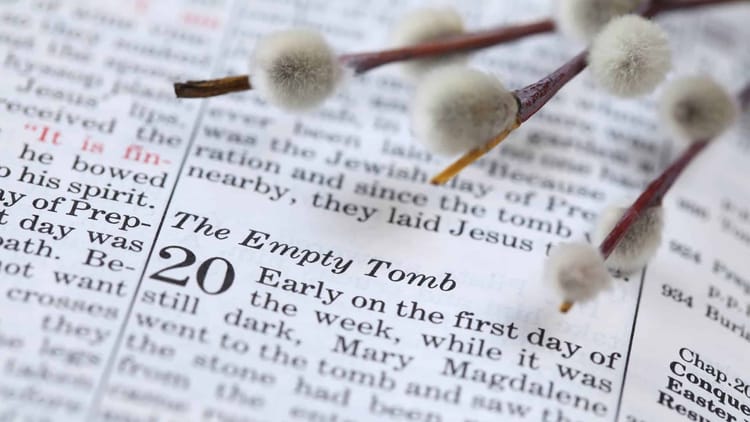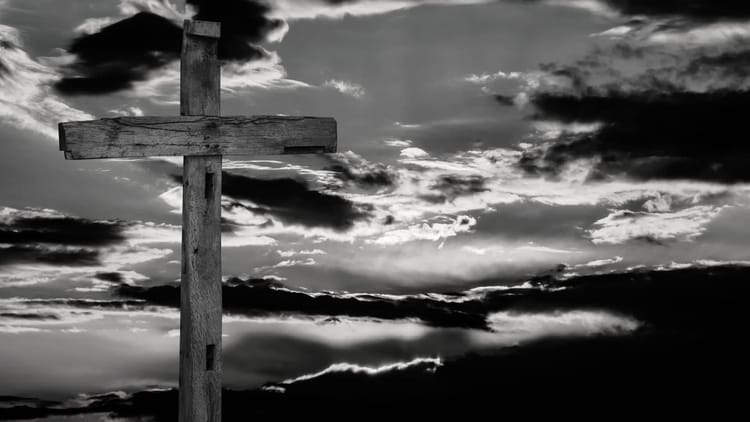It Is Finished (John 19:28-30)

Most deaths, when they occur, come as a surprise. This past week, Tim Hetherington, an Oscar-nominated filmmaker and photographer, was killed in Misrata, Libya. His last tweet is chilling: “In besieged Libyan city of Misrata. Indiscriminate shelling by Qaddafi forces. No sign of NATO.” He was killed the very next day, a victim of a rocket-propelled grenade in that war-torn country.
It would be easy to see the death of Jesus as a surprise. It was Passover. Tensions in Jerusalem were running high. We’ve seen recently what happens when massive crowds gather, especially when there’s political unrest and suspicion. It’s a tinderbox. I’m sure that many back then thought that Jesus was caught up, arrested and killed, by events that were swirling out of control.
But the text we have in front of us says something very important. John 19:30 says, “When Jesus had received the sour wine, he said, ‘It is finished,’ and he bowed his head and gave up his spirit.” This morning, I’m preaching a sermon on one word, the last word that Jesus spoke before dying. In our English versions it’s three words: “It is finished.” It’s Jesus’ last teaching before he dies, the last thing that he has to say. In Greek, it’s one word: tetelestai. It means that all has now been completed. It’s not the cry of a victim who’s caught up in events that are out of control. It’s the triumphant announcement of someone who is fulfilling his mission, who sees that all the necessary steps have been taken and fulfilled.
Here’s what we need to see: Jesus was not a victim. At the cross, he fulfilled his obligations and did what he set out to do. Earlier, Jesus had said:
For this reason the Father loves me, because I lay down my life that I may take it up again. No one takes it from me, but I lay it down of my own accord. I have authority to lay it down, and I have authority to take it up again. This charge I have received from my Father. (John 10:18)
Still later he said this as he looked forward to the cross:
I glorified you on earth, having accomplished the work that you gave me to do. (John 17:4)
And here, even as he’s being killed, you see him in complete control of what’s happening. This is so much so that when he dies, John says that he “gave up his spirit.”
Here’s the one thing I want you to hear this morning as we look at the final teaching from Jesus as he hung on the cross: At the cross, Jesus completed his work. At the cross, Jesus finished what he set out to do.
And specifically (and briefly) I want to look at two things that Jesus finished at the cross: he fulfilled Old Testament prophecies; and he completed the plan of redemption.
First: Jesus fulfilled Old Testament prophecies.
Verses 28 and 29 say:
After this, Jesus, knowing that all was now finished, said (to fulfill the Scripture), “I thirst.” A jar full of sour wine stood there, so they put a sponge full of the sour wine on a hyssop branch and held it to his mouth.
At first glance the Bible looks like a huge book of many different types of stories. If you’ve attended church for a while, you’ve heard many of them. But then there are huge parts of Scripture that you don’t hear a lot about, that are sometimes more difficult to understand. When you pick up this book, it’s easy to think that it’s a mishmash of loosely related stories and themes that go in every direction.
But when Jesus lived, he kept picking up threads from the stories that we thought were unrelated. Genesis 28 tells the story of angels ascending and descending on a ladder. In John 1, Jesus says that this story is about him. Numbers 21 tells the story of Moses placing a bronze serpent on a pole. In John 3, Jesus says that this story is all about him. In John 8, Jesus claims to be the God who revealed himself to Moses at the burning bush. When one of the disciples turns against him, Jesus points to this as a fulfillment of Scripture. Over and over again, both John and Jesus take the Old Testament Scriptures and say that it’s not an unrelated series of stories. It’s all about him.
Here John alludes to what seems at first to be an obscure verse from Psalm 69:21. The psalmist is writing as a faithful person who is suffering. In the middle of the psalm, the psalmist says, “They gave me poison for food, and for my thirst they gave me sour wine to drink.” We would probably never read that and think that this is a prophesy about Jesus. But on the cross, Jesus says that this too is about him. Crucifixion used thirst as part of the process of torture. As Jesus hung on the cross, though, his primary concern was not for his own thirst. His mind was on the relevance of what David wrote and how it applied to Jesus. And so Jesus said, “I thirst,” so that we could compete, and fulfill, all that was written in the Old Testament about him.
David Greenglass was a World War II traitor. He gave atomic secrets to the Soviet Union and then fled to Mexico after the war. His conspirators arranged to help him by planning a meeting with the secretary of the Soviet ambassador in Mexico City. Proper identification for both parties became vital. Greenglass was to identify himself with six prearranged signs. These instructions had been given to both the secretary and Greenglass so there would be no possibility of making a mistake. The signs were:
- once in Mexico City, Greenglass was to write a note to the secretary, signing his name as ‘‘I. Jackson”;
- after three days he was to go to the Plaza de Colon in Mexico City, and
- stand before the statue of Columbus,
- with his middle finger placed in a guide book. In addition,
- when he was approached, he was to say it was a magnificent statue and that he was from Oklahoma.
- The secretary was to then give him a passport.
The six prearranged signs worked. Why? With six identifying characteristics, it was impossible for the secretary not to identify Greenglass as the proper contact. How true, then, it must be that Jesus of Nazareth is the Messiah if he had 456 identifying characteristics well in advance and fulfilled them all. When Jesus said on the cross, “It is finished,” he was stating that all of Scripture is about him, and that he has fulfilled all the Old Testament prophecies and signs that point to him. It’s what Paul meant when he wrote, “Christ died for our sins in accordance with the Scriptures.” As Spurgeon put it, “He meant, first of all, that all the types, promises, and prophecies were now fully accomplished in him.”
Secondly: Jesus completed the plan of redemption.
Not only did Jesus fulfill all the Old Testament prophecies; he also completed the plan of redemption. Think again about what Jesus prayed the night before he said these words. In John 17:4 he prayed, “I glorified you on earth, having accomplished the work that you gave me to do.” You may want to ask, what is the work that God gave him to do? It’s a good question. Jesus had hinted a few times throughout John that he was sent by his Father to do something. In John 4:34 he said, “Jesus said to them, ‘My food is to do the will of him who sent me and to accomplish his work.’” In John 9:4 he said, “We must work the works of him who sent me while it is day; night is coming, when no one can work.”
So we get a sense that Jesus was up to something. Jesus knew that he was sent for a purpose. Surprisingly, Jesus announces that he has finished his work at a surprising moment. His work involves his death. On the cross, he can say that he has completed the assignment that God has given him.
We need to ask what it is that Jesus finished or completed on the cross. And the answer is this: he completed the plan of redemption. We have a problem: we have sinned against God. All throughout Scripture, God gives us hints as to how he will deal with this problem. In the Garden of Eden, after Adam and Eve sin, God covers their nakedness with the skins of animals. Death had to take place in order for shame to be covered. When God brought Israel out of Egypt, he commanded them to celebrate Passover. At Passover they would sacrifice the Passover lamb. They would mark the doorposts of their homes with the blood of a spring lamb. God said that when he saw the blood, he would pass over them. He would spare their lives. Blood had to be shed so that they could live. Then God instituted a sacrificial system. At the temple, priests would sacrifice the blood of goats and calves. You had this sense that our sin demands justice, and that justice must be paid. The killing of animals pointed to what was necessary. But you’d also have the sense that it wasn’t enough. The blood of animals is not enough to meet the demands of justice. Besides, the sacrifices were ongoing. Tomorrow there would be more sin, and more sacrifices would have to be shed. If you’ve ever seen what a sacrifice is like – they have a video on YouTube – you would realize that it’s a messy thing, and one that you wish could end.
Then Jesus comes along. In John 1, John the Baptist looks at Jesus and says, “Behold, the Lamb of God, who takes away the sin of the world!” Do you know what John is saying? Jesus is the ultimate sacrifice that all the other sacrifices pointed to. At this death, he pays the ultimate price for sin. On the cross Jesus sheds his blood to deal once and for all with sin. He bears the judgment as the sacrifice for our sins. On the cross, Jesus could say, “It is finished,” and say that the plan of redemption has finally and fully been completed. The word that Jesus uses for “It is finished” is one that people would write on a bill once it had been paid. Jesus is saying here that the bill has been finally paid. His work is now complete. Hebrews says, “He entered once for all into the holy places, not by means of the blood of goats and calves but by means of his own blood, thus securing an eternal redemption” (Hebrews 9:12).
I love how Spurgeon puts it:
The debt was now, to the last farthing, all discharged. The atonement and propitiation were made once for all, and for ever, by the one offering made in Jesu’s body on the tree. There was the cup, hell was in it, the Savior drank it — not a sip and then a pause; not a draught and then a ceasing, but he drained it till there is not a dreg left for any of his people. The great ten-thonged whip of the law was worn out upon his back, there is no lash left with which to smite one for whom Jesus died. The great cannonade of God’s justice has exhausted all its ammunition, there is nothing left to be hurled against a child of God. Sheathed is thy sword, O Justice! Silenced is thy thunder, O Law! There remains nothing now of all the griefs, and pains, and agonies which chosen sinners ought to have suffered for their sins, for Christ has endured all for his own beloved, and “it is finished.”
When Jesus said, “It is finished,” he meant that he had fulfilled the Old Testament prophesies that pointed to him. He also meant that he had completed the work that God had sent him to do, of offering his life as a sacrifice for our sins.
So let’s think for a minute of what this means for us.
I don’t know that there could be any better news than this one word that Jesus proclaimed from the cross: It is finished. It means that the work is finally and fully complete. There is nothing left to do other than to receive the benefits of this work, to put our faith in the one who offered his life as a sacrifice for sin. Christ came to secure for us what we could never secure for ourselves. He finished the work that God sent him to do.
Author James Herriot tells of an unforgettable wedding anniversary he and his wife celebrated early in their marriage. His boss had encouraged him to take his wife to a fancy restaurant, but Herriot balked. He was a young veterinarian and couldn’t really afford it. “Oh, do it!” the boss insisted. “It’s a special day!” Herriot reluctantly agreed and surprised his wife with the news.
En route to the restaurant, Herriot and his wife stopped at a farm to examine a farmer’s horse. Having finished the routine exam, he returned to his car and drove to the restaurant, unaware that his checkbook had fallen in the mud. After a wonderful meal, Herriot reached for his checkbook and discovered it was gone. Quite embarrassed, he tried to offer a way of making it up. He had no way to pay the bill that he had incurred.
“Not to worry,” the waiter replied. “Your dinner has been taken care of!” As it was, Herriot’s employer had paid for the dinner in advance.
God has done the same for us. Jesus’ utterance on the cross, “It is finished,” is a Greek term meaning “paid in full.”
One more story. A girl signed up for a class on English literature. She found it far more difficult than she had expected, and she desperately wanted to drop it. She went in to see the teacher to see if she could drop out and switch to a regular English class as well. The head of the department said to her, “I know how you feel. What if I promised you and A no matter what you did in the class? If I gave you an A before you even started, would you be willing to take the class?”
The girl said, “Well, I think I could do that.” The teacher said, “I’m going to give you an A in the class. You already have an A, so you can go to class.” The teacher took the threat of a bad grade away so that she could be freed to do her best without fear of punishment.
That is what God has done for us. At the cross, Jesus dealt with our sins. He finished the work. The course is complete. We’ve been given an A, not because we earned it, but because Jesus did. The threat of failure, judgment, and condemnation has been removed. It is finished; everything has been done. We only have to receive what Christ has done for us at the cross in offering his life for us.
At the cross, Jesus completed his work. You can stake your life on it.





